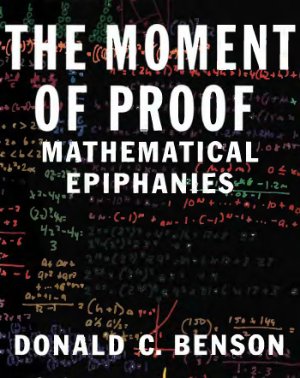Oxford University Press, 2000. - 352 Pages.
The world described by mathematics might seem strange and daunting, but it is our world nonetheless. If you've ever experienced the pleasure of a sudden flash of mathematical insight--even while balancing your checkbook--then you know how miraculous a few digits and an equal sign can become at just the right time. Mathematician Donald C. Benson is intimately familiar with this phenomenon, and he has written The Moment of Proof: Mathematical Epiphanies to remind us that math can be as much fun as mountain climbing (and, of course, just as challenging). Part textbook, part puzzle book, it rewards our hard work with a steady flow of wide-eyed moments of clarity as we see how simple and elegant even the most frightening problem can be.
Benson covers classic problems like the sliding-tile and birthday-matching puzzles, but also delves into abstractions: counting, sorting, and "interesting numbers" all jump into his spotlight. This is fascinating enough, but his explanations of Russian peasant math and the secrets of the abacus have just the right mix of concreteness and abstraction to please anyone but the terminally mathphobic. Benson does expect quite a bit from his readers; paper and pencil are essential for complete understanding. But with each new epiphany, each new glimpse into the workings of the world, the effort invested in The Moment of Proof is retued, with interest.
The world described by mathematics might seem strange and daunting, but it is our world nonetheless. If you've ever experienced the pleasure of a sudden flash of mathematical insight--even while balancing your checkbook--then you know how miraculous a few digits and an equal sign can become at just the right time. Mathematician Donald C. Benson is intimately familiar with this phenomenon, and he has written The Moment of Proof: Mathematical Epiphanies to remind us that math can be as much fun as mountain climbing (and, of course, just as challenging). Part textbook, part puzzle book, it rewards our hard work with a steady flow of wide-eyed moments of clarity as we see how simple and elegant even the most frightening problem can be.
Benson covers classic problems like the sliding-tile and birthday-matching puzzles, but also delves into abstractions: counting, sorting, and "interesting numbers" all jump into his spotlight. This is fascinating enough, but his explanations of Russian peasant math and the secrets of the abacus have just the right mix of concreteness and abstraction to please anyone but the terminally mathphobic. Benson does expect quite a bit from his readers; paper and pencil are essential for complete understanding. But with each new epiphany, each new glimpse into the workings of the world, the effort invested in The Moment of Proof is retued, with interest.

